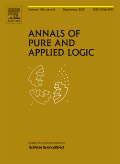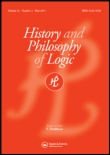
Logica Universalis
metrics 2024
Charting New Territories in Mathematical Logic
Introduction
Logica Universalis is an esteemed academic journal published by SPRINGER BASEL AG, dedicated to advancing the fields of Applied Mathematics and Logic. With its ISSN 1661-8297 and E-ISSN 1661-8300, the journal has been active from 2007 and continues to contribute significantly to the discourse surrounding mathematical logic and its applications up to 2024. Located in Basel, Switzerland, Logica Universalis holds a notable position within the academic community, evidenced by its ranking within the Q4 category of both Applied Mathematics and Logic as of 2023. While it currently operates without Open Access options, the journal remains a pivotal resource for researchers and practitioners seeking to explore foundational and applied aspects of logic. Moreover, with a Scopus rank of #22/41 in Logic and #464/635 in Applied Mathematics, it provides a platform for comprehensive knowledge dissemination and facilitates innovative research that bridges theoretical and practical methodologies. This journal is instrumental for anyone looking to deepen their understanding and make meaningful contributions to these intertwined domains.
Metrics 2024
 0.23
0.23 0.40
0.40 0.50
0.50 21
21Metrics History
Rank 2024
Scopus
IF (Web Of Science)
JCI (Web Of Science)
Quartile History
Similar Journals

Reports on Mathematical Logic
Unraveling the Complexities of Mathematical ReasoningReports on Mathematical Logic is an esteemed academic journal published by Jagiellonian University’s Theoretical Computer Science Department in Poland. Focusing on the interdisciplinary realms of logic and philosophy, this journal publishes rigorous research articles that explore the foundational aspects and implications of mathematical logic in various contexts. Although it currently maintains an open access model, the journal's impact can be seen through its categorized rankings, with a Q4 in Logic and a commendable Q2 in Philosophy as of 2023. This positions it as a valuable resource for academics seeking to engage with innovative ideas and methodologies in the field. Additionally, the journal has a historical academic presence, having converged in its publication years from 2011 to 2014 and again from 2016 to 2023, underscoring its ongoing commitment to advancing knowledge in logic. With a focus on contemporary research, Reports on Mathematical Logic is essential for researchers, professionals, and students aiming to stay at the forefront of logic studies.

ANNALS OF PURE AND APPLIED LOGIC
Elevating the Standards of Logical DiscourseANNALS OF PURE AND APPLIED LOGIC is a premier academic journal published by Elsevier, specializing in the foundational aspects of logic since its inception in 1974. With a strong commitment to disseminating original research, the journal focuses on both pure and applied logic, making significant contributions to the fields of mathematics and computer science. The journal is recognized for its rigorous peer-review process and is currently ranked Q1 in Logic, reflecting its status among the top-tier publications in the discipline. Researchers will find valuable insights and advancements in logical theory and practice in its pages, while the journal's Scopus ranking further positions it strategically within the mathematical logic community. Although it is not an open-access publication, it offers convenient access options for institutions and subscribers, ensuring a wide reach for groundbreaking findings. The ANNALS OF PURE AND APPLIED LOGIC continues to be an essential resource for professionals, students, and academics alike, facilitating a deeper understanding of logical frameworks and their applications.

Analisis Filosofico
Fostering critical analysis and innovative perspectives.Analisis Filosofico is a leading open-access journal published by SOC ARGENTINA ANALISIS FILOSOFICO, dedicated to advancing the field of philosophy. Since its inception in 2004, the journal has provided a platform for rigorous philosophical discourse and critical analysis, contributing significantly to the development of contemporary philosophical thought, particularly in the Latin American context. With an ISSN of 0326-1301 and an E-ISSN of 1851-9636, it has consistently maintained a robust presence in academic circles, as evidenced by its rank of #349 out of 806 in the Arts and Humanities Philosophy category on Scopus. The journal currently holds a commendable Q2 status in its category quartiles for 2023 and is positioned in the 56th percentile, reflecting its quality and influence among peers. Situated in Buenos Aires, Argentina, Analisis Filosofico engages with a diverse readership, encouraging scholars, professionals, and students to explore new theoretical perspectives and contribute original research. With ongoing topics converging from 2017 to 2024, this journal not only disseminates philosophical knowledge but also fosters innovative collaborations across the global scholarly community.

Fuzzy Information and Engineering
Advancing the Frontiers of Fuzzy Systems and EngineeringFuzzy Information and Engineering is a prestigious open access journal recognized for its contributions to the interdisciplinary fields of applied mathematics, control systems engineering, artificial intelligence, and information systems, published by TSINGHUA UNIVERSITY PRESS. With an impact factor that reflects its increasing influence, the journal has maintained a strong position in the academic community since its inception in 2011, converging its focus between 2014 and 2024. The journal is indexed in notable databases such as Scopus, demonstrating solid rankings across its categories, including a commendable Q3 classification in applied mathematics and control systems engineering. By fostering innovative research and disseminating key findings, Fuzzy Information and Engineering serves as a vital platform for researchers, professionals, and students alike, promoting advancements in fuzzy systems and their applications within diverse domains. Notably, since transitioning to an open access model in 2015, the journal has enhanced accessibility for a global audience, encouraging collaborative efforts in academia and industry.

Journal of Applied Mathematics & Informatics
Advancing Computational Techniques for Real-World Applications.Journal of Applied Mathematics & Informatics is a peer-reviewed academic journal published by the Korean Society of Computational & Applied Mathematics (KSCAM), focusing on the integration and application of mathematical theories and computational techniques across various domains. Established in 2019, this journal serves as a platform for researchers, professionals, and students to share innovative methodologies, practical applications, and theoretical advancements in fields like analysis, applied mathematics, and computational theory. As a Q4 ranked journal according to the 2023 category quartiles in analysis, applied mathematics, computational mathematics, and miscellaneous mathematics, it provides a valuable, albeit niche, contribution to the academic landscape. While the journal currently operates without open access options, it aims to disseminate quality research to foster collaboration and knowledge exchange within the mathematics and computer science communities. Researchers looking to explore emerging trends and methodologies in applied mathematics and informatics will find an essential resource in this journal, which is based in Daejeon, South Korea.

Australasian Journal of Logic
Cultivating insights that shape logical research.The Australasian Journal of Logic is a prominent scholarly publication in the field of logic, published by the Australasian Association for Logic. With an ISSN of 1448-5052, this journal serves as a vital platform for disseminating research that advances the understanding and application of logical theory and its intersection with various disciplines. Although it is not open access, its rigorously peer-reviewed articles cater to academics, researchers, and students keen on exploring contemporary issues in logic both in theoretical and practical domains. The journal aims to foster scholarly communication and collaboration within the logic community, encouraging the exchange of ideas and insights that shape the future of logical studies. By contributing to the growing body of knowledge in this essential field, the Australasian Journal of Logic plays a crucial role in enhancing the intellectual landscape of logic research.

JOURNAL OF AUTOMATED REASONING
Fostering Excellence in Automated Reasoning MethodologiesJOURNAL OF AUTOMATED REASONING is a premier academic journal published by SPRINGER, focusing on the dynamic and evolving fields of Artificial Intelligence, Computational Theory and Mathematics, and Software. With an ISSN of 0168-7433 and E-ISSN 1573-0670, this journal ranks impressively in the second quartile (Q2) across multiple categories, reflecting its significant contribution to the advancement of knowledge in automated reasoning methodologies. Since its inception in 1985, it has served as a vital platform for researchers and professionals to share groundbreaking findings and innovative techniques, facilitating the exploration of algorithms, logical frameworks, and reasoning processes that underpin artificial intelligence systems. Although it does not currently offer Open Access options, it remains a highly regarded resource, cited widely in academia, with its impactful publications reflecting deep insights and rigorous scholarly standards. The journal’s esteemed status and its ongoing commitment to fostering a greater understanding of automated reasoning make it an invaluable asset for those dedicated to pushing the boundaries of these interdisciplinary fields.

HISTORY AND PHILOSOPHY OF LOGIC
Charting the Philosophical Evolution of LogicHISTORY AND PHILOSOPHY OF LOGIC is a prestigious journal published by Taylor & Francis Ltd, focusing on the intricate relationships between historical contexts and philosophical inquiries within the realm of logic. With its ISSN 0144-5340 and E-ISSN 1464-5149, the journal has established itself as a vital academic resource since its inception in 1980 and will continue to contribute to the field until 2024. It holds an impressive status, ranking in the Q1 category in History and Q2 in History and Philosophy of Science according to the 2023 category quartiles. This journal is recognized for its high-impact research, achieving notable positions in Scopus ranks, including 80th percentile in Arts and Humanities - History and 58th percentile in History and Philosophy of Science. Although it does not offer open access, it remains a crucial platform for scholars, researchers, and students aiming to explore and advance knowledge at the intersection of logic's history and its philosophical implications.

Studia Logica
Charting New Territories in Logic and ScienceStudia Logica is a leading international journal published by Springer that focuses on the intricate interconnections between logic, philosophy, and the history of science. Established in 1953, this journal has garnered an esteemed reputation, consistently appearing in the Q1 category for History and Philosophy of Science and Q2 for Logic in 2023. With a robust Scopus ranking, where it stands at #42 out of 223 in the field of Arts and Humanities and #17 out of 41 in Mathematics (Logic), Studia Logica is pivotal for researchers and scholars keen on exploring the foundations and implications of logical theory and its applications. The journal does not follow an open access model, ensuring that the published work maintains a high standard of quality and rigor. Located in Dordrecht, Netherlands, the journal continues to be a crucial conduit for advancing scholarly discourse and disseminating cutting-edge research in its respective fields.

JOURNAL OF LOGIC AND COMPUTATION
Exploring the Nexus of Theory and TechnologyJOURNAL OF LOGIC AND COMPUTATION, published by Oxford University Press, is a leading peer-reviewed journal dedicated to advancing research in the intersections of logic, computation, and theoretical frameworks of computer science. With an ISSN of 0955-792X and an E-ISSN of 1465-363X, the journal has established itself within academic circles, boasting significant impact evidenced by its category quartiles, including a Q1 ranking in Arts and Humanities (miscellaneous) and a Q2 in Logic for 2023. This prestigious journal emphasizes interdisciplinary approaches to understanding computational systems, hence targeting a diverse audience of researchers, professionals, and students keen on exploring provocative questions in logic and computation. Although not open access, the content is highly valuable, reflecting contemporary challenges and advancements in the field. With over three decades of published work, spanning from 1990 to 2024, the journal continues to contribute richly to the discourse surrounding logical methodologies and computational innovations, making it an essential resource for those engaged in these dynamic areas of study.